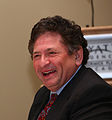
Leroy "Lee" Edward Hood is an American biologist who has served on the faculties at the California Institute of Technology (Caltech) and the University of Washington. Hood has developed ground-breaking scientific instruments which made possible major advances in the biological sciences and the medical sciences. These include the first gas phase protein sequencer (1982), for determining the sequence of amino acids in a given protein; a DNA synthesizer (1983), to synthesize short sections of DNA; a peptide synthesizer (1984), to combine amino acids into longer peptides and short proteins; the first automated DNA sequencer (1986), to identify the order of nucleotides in DNA; ink-jet oligonucleotide technology for synthesizing DNA and nanostring technology for analyzing single molecules of DNA and RNA.

Herbert Wayne "Herb" Boyer is an American biotechnologist, researcher and entrepreneur in biotechnology. Along with Stanley N. Cohen and Paul Berg, he discovered a method to coax bacteria into producing foreign proteins, which aided in jump-starting the field of genetic engineering.

Paul Berg was an American biochemist and professor at Stanford University.

Thomas R. Tritton was the twelfth president of Haverford College, serving from 1997 to 2007. After his presidency, he served as president in residence at the Harvard Graduate School of Education. From 2008 to 2013, he served as president and CEO of the Chemical Heritage Foundation.

Robert Samuel Langer Jr. FREng is an American biotechnologist, businessman, chemical engineer, chemist, and inventor. He is one of the twelve Institute Professors at the Massachusetts Institute of Technology.

George Rosenkranz was a pioneering Hungarian-born scientist in the field of steroid chemistry, who used native Mexican plant sources as raw materials. He was born in Hungary, studied in Switzerland and emigrated to the Americas to escape the Nazis, eventually settling in Mexico.
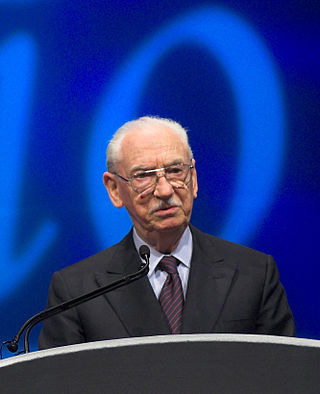
Alejandro Zaffaroni was a Uruguayan serial entrepreneur who was responsible for founding several biotechnology companies in Silicon Valley. Products that he was involved in developing include the birth control pill, the nicotine patch, corticosteroids, and the DNA microarray.
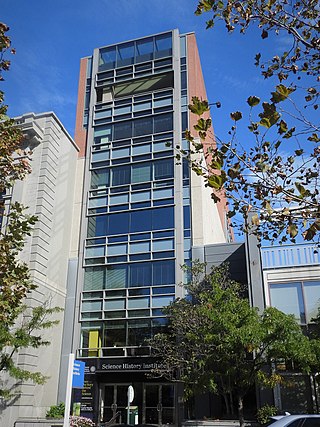
The Science History Institute is an institution that preserves and promotes understanding of the history of science. Located in Philadelphia, Pennsylvania, it includes a library, museum, archive, research center and conference center.
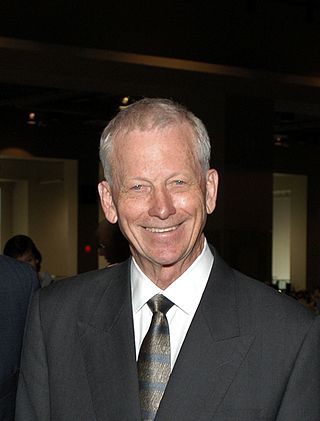
William J. Rutter is an American biochemist who cofounded the early biotechnology company Chiron Corporation together with Edward Penhoet and Pablo DT Valenzuela. As chairman of the department of biochemistry and biophysics of the University of California, San Francisco, Rutter helped establish that department as a leader in the academic side of the biotechnology during the San Francisco Bay Area biotech boom of the 1980s.
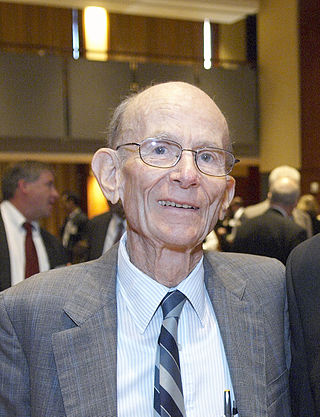
John Charles Haas was an American businessman and philanthropist, at one time considered the second richest man in Philadelphia. He was the chairman of global chemical company Rohm and Haas from 1974 to 1978. Under his leadership, the family's William Penn Foundation became a $2 billion grantmaking institution, ranking as one of the largest such institutions in the United States.
Life Sciences Foundation (LSF) was a San Francisco-based nonprofit organization that was established in 2011 to collect, preserve, interpret, and promote the history of biotechnology. LSF conducted historical research, maintained archives and published historically relevant materials and information.
George Blatz Rathmann (1927–2012) was an American chemist, biologist, pioneer in biotechnology and corporate executive. In 1980 he co-founded and served as the first CEO of Amgen, and later founded Icos.

The Othmer Gold Medal recognizes outstanding individuals who contributed to progress in chemistry and science through their activities in areas including innovation, entrepreneurship, research, education, public understanding, legislation, and philanthropy. The medal is presented annually under the sponsorship of the Science History Institute and four affiliated organizations: the American Chemical Society (ACS), the American Institute of Chemical Engineers (AIChE), The Chemists' Club, and the American section of the Société de Chimie Industrielle, at the Science History Institute's Heritage Day.
The Petrochemical Heritage Award was established in 1997, "to recognize individuals who made outstanding contributions to the petrochemical community." The award is intended to inspire achievement and to promote public understanding. The award winner is chosen annually by the Founders Club and the Science History Institute. The award is traditionally presented at the International Petrochemical Conference hosted by the American Fuel and Petrochemical Manufacturers (AFPM), formerly known as NPRA, the National Petrochemical & Refiners Association.

The Pittcon Heritage Award recognizes "outstanding individuals whose entrepreneurial careers shaped the instrumentation and laboratory supplies community." The award is jointly sponsored by the Pittsburgh Conference on Analytical Chemistry and Applied Spectroscopy (Pittcon) and the Science History Institute. The award is presented annually at a special ceremony during Pittcon.
The Roy G. Neville Prize in Bibliography or Biography is a biennial award given by the Science History Institute to recognize a biographical work in the field of chemistry or molecular science. The Roy G. Neville Prize was established in 2006 and named to honor scientist and book collector Roy G. Neville. Neville founded Engineering and Technical Consultants, Redwood City, California, in 1973. He also assembled one of the world's largest collections of rare books in the field of science and technology. The Neville collection, including over 6,000 titles from the late 15th century to the early 20th century, was acquired by the Chemical Heritage Foundation in 2004.
The Jacob and Louise Gabbay Award in Biotechnology and Medicine or Gabbay Award is an annual prize established in 1998 by the Jacob and Louise Gabbay Foundation to recognize outstanding work in the biomedical sciences. The award is administered by the Rosenstiel Basic Medical Sciences Research Center at Brandeis University in Waltham, Massachusetts and is worth $15,000. The winner also receives a medal and delivers a lecture on his or her work.

Arnold Thackray is an emeritus professor at the University of Pennsylvania. Initially an English chemist, he became an entrepreneurial American. Thackray founded or extended a series of institutions, initially in Philadelphia, then on a wider scale within the History of Science Society (HSS) and through Science History Consultants, and the Life Sciences Foundation.

Joshua S. Boger is an organic chemist and the founder of Vertex Pharmaceuticals Incorporated. He is considered a pioneer in the field of structure-based rational drug design. Drugs developed include amprenavir, an HIV protease inhibitor; telaprevir, a protease inhibitor for treatment of hepatitis C; and Kalydeco, for the treatment of cystic fibrosis. In 2003, Vertex was listed as one of forty worldwide Technology Pioneers by the World Economic Forum. As of 2012, Boger became executive chairman of Alkeus Pharmaceuticals.

William H.Rastetter, a scientist, entrepreneur and venture capitalist, is the chair of Neurocrine Biosciences, of Fate Therapeutics, and of Daré Bioscience, Inc. in San Diego, California. He is a founding board member and investor in GRAIL, Inc. in Menlo Park, California, and served for a period as the company's interim CEO (2017) and chair (2017-2018). Rastetter is also a director of Regulus Therapeutics and Entos, Inc.. He was a partner in the venture firm Venrock (2006-2013), and a trustee at Caltech (2015-2018). He has served as a director (1998-2016) and as chair of Illumina (2005-2016). He advised SVB Leerink (2014-2019) and currently advises Illumina Ventures.

















